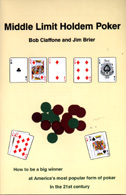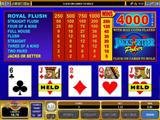
Middle Limit Hold'em Poker
A Hold'em Quiz
 Bob Ciaffone is one of America’s best-known poker players, writers, and teachers. He has numerous poker tournament wins and placings, the most prominent being third place in the 1987 World Championship. He has been a poker teacher since 1995, with his students having earned well over a million dollars in tournament play. Bob's website is www.pokercoach.us taken from his quiz and reworked by me to suit this column. I am giving the answers and an explanation of them after the questions, but you are encouraged to cover them up until you provide your own answers first.
Bob Ciaffone is one of America’s best-known poker players, writers, and teachers. He has numerous poker tournament wins and placings, the most prominent being third place in the 1987 World Championship. He has been a poker teacher since 1995, with his students having earned well over a million dollars in tournament play. Bob's website is www.pokercoach.us taken from his quiz and reworked by me to suit this column. I am giving the answers and an explanation of them after the questions, but you are encouraged to cover them up until you provide your own answers first.
1. The effect of having cards in the “playing zone” of ace down through 9 come on the flop is:
(a) They are more likely to connect with someone’s hand because preflop they get played more often.
(b) Cards in the playing zone lead to a lot of bluffing.
(c) No cards in the playing zone would have been the easiest flop with which to steal a pot.
Answer: (a) Big cards justifiably get played more often, so when the flop comes big, it usually hits several people, and bluffing does not figure to work. A flop with one card in the playing zone is easier to steal than a flop with no cards in the playing zone. With all little cards, players are often drawing to two overcards. If they have no overcards, they fold a lot more often.
2. A tainted card or draw is:
(a) A card that improves your hand, but could easily give one of your opponents an even better hand.
(b) A card or draw that will win only a small pot.
(c) A card or draw that gives you a losing hand.
Answer: (a) A tainted draw has one or more of your outs possibly giving your opponents a bigger hand. The most common taints are when there is a two-flush on the board and one of your outs is a flush card, and when one of your overcards makes a possible straight on the board.
3. Which one of the following statements is most likely to be true?
(a) A raise on the flop shows a strong holding.
(b) Raises on the turn are generally suspicious.
(c) The higher the limit on a betting round, the more meaningful the action.
Answer: (c) A player with a good hand prefers to reveal his full strength on an expensive street; a player with a marginal hand prefers to feel the situation out at a cheaper price.
4. Position is most important when there are:
(a) Two players in for the flop.
(b) Four players in for the flop.
(c) Six players in for the flop.
Answer: (b) When heads up, it is less dangerous to check a good hand. With many players, you may be able to save a bet by your position, but you will not win the pot with it. Position is most important with three or four players.
5. Which of the following considerations is most frequently overlooked by players when they assess their winning chances?
(a) The number of outs they have.
(b) The size of the pot.
(c) The possibility of making their hand and still losing.
Answer: (c) Players often count their outs to improve, and then treat those improvements as winners when they are not hitting to the nuts. An example is when trying to improve by pairing overcards. Drawing to try to make a pair is risky business; one pair often loses.
6. When seated in the small blind and facing a legitimate raise, which of the following is a good rule of thumb?
(a) Often call, since you are partway in already.
(b) If you are going to play, reraise to drive out players.
(c) If you would not call the raise on the button, don’t call from the small blind.
Answer: (c) In limit hold’em, the button is worth perhaps a quarter of a big bet. This rule equating the small blind with the button was formulated by me to help keep players faced with a preflop raise from overevaluating that they already had a dab of money in the pot.
7. An important mathematical aspect of hold’em is the fact that an unpaired hand will improve by making a pair, straight draw, or flush draw about:
(a) A quarter of the time.
(b) A third of the time.
(c) Half the time.
Answer: (b) A third of the time. Bulldozer-type players often try to make good use of this mathematical fact by raising preflop, then betting aggressively after the flop whether they hit or not, figuring you will have to fold most of the time. That is why you need to fight fire with fire, sometimes playing back against a bully, and not give up every time you miss the flop.
8. The boundary line between having a large number of opponents and a small number is:
(a) Three
(b) Four
(c) Five
Answer: (a) With two opponents, you must be aggressive. With four or more opponents, you need a real hand to pump the pot, and conservatism is required. With three opponents, you are on the bubble, and have to take into account factors like the texture of the flop and whom you are facing.
9. Which one of the following statements is most likely to be correct regarding the need for betting the turn?
(a) Because you don’t think a check-raise will work.
(b) To make the pot bigger so that when you win, you’ll win a bigger pot.
(c) Because the betting limit has doubled, many marginal flop callers will now fold.
Answer: (c) The size of the bet, of course, has a great effect on the decision to call. Good players have a strong follow-through to their flop betting because they know it is a lot harder to call a full-size bet than a half-size one (plus, the opponent did not raise on the flop).
10. Which one of the following statements is most likely to be true when you get raised on the turn?
(a) The raiser will usually be semibluffing.
(b) The raiser can frequently beat top pair or an overpair.
(c) The raiser wants to discourage anyone from betting the river.
Answer: (b) A raise on the turn is seldom a bluff, because the player is risking more money, and drawing hands have lost half their punch by already missing on the first of two cards to come. When you get popped on the turn and hold only one pair, chances are that you need to improve.
Scoring: 10 — You should write a poker book. 9 — You are a strong player. 8 — You can hold your own. 7 — You are probably a break-even player. 6 — You need to read a good poker book. 5 — You need to read several good poker books. 4 — Your spouse is worried about your busting the family budget plans. 3 — Divorce court is lurking. 2 — Switch to craps and give yourself a better chance of winning. 1 — Buy lottery tickets and give yourself a better chance of winning. 0 — You are sandbagging on the test; no one is this bad.

